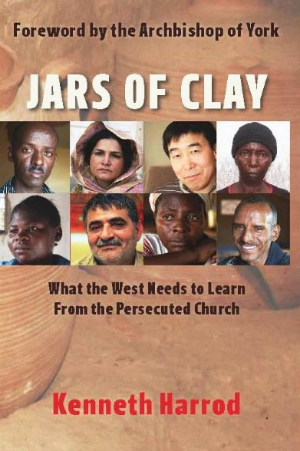Learning from the persecuted church
Eternal life with Christ should constantly be on our lips, writes Bob Holman
 Jars of Clay - What the West needs to learn from the persecuted church
Jars of Clay - What the West needs to learn from the persecuted church
Kenneth Harrod
Release International
ISBN 978-0-9559693-1-7
Reviewed by Bob Holman
Christian churches and individual Christians do not suffer much persecution in Britain. Certainly, Christians may be laughed and sneered at, their faith may be attacked by academic atheists and unknown numbers may miss out on promotion at work because superiors dislike Christians.
However, their churches are not destroyed, they are rarely physically attacked, their schools are not burnt down and children kidnapped, they are not subjected to physical attacks and murder with the state offering little protection.
Kenneth Warren is a former journalist and now an ordained minister who has made a study of persecution. As a member of staff for Release International he has travelled widely in Africa and Asia. He points out that persecution is as old as Christianity. Jesus Christ was pursued by the state authorities, was arrested, bound, whipped and crucified to death. He warned his followers, “If they persecuted me, they will also persecute you”(John 15: 20).
And so it happened. The early church soon saw Stephen stoned to death. Other disciples were executed. Many fled from their homes. Initially, Saul of Tarsus led the persecution. He changed completely when he met Jesus. His letters have much to say about the persecution he witnessed and suffered in his travels. He even wrote, “For I consider that the sufferings of this present time are not worth comparing with the glory that is to be revealed to us”(Romans 8:18). Such a belief inspired Christians to witness in the face of torture and death. The church multiplied.
In a foreword, the Archbishop of York, John Sentamu, states that although Christians in the West are shocked when they hear of the persecution abroad, “we lack the magnanimity to embrace, as we should, the struggles of those who are at the (literally) sharp end of today’s conflicts”.
Warren then shows just what we can learn from the persecuted, particularly in their faithfulness, understanding of the real gospel and Christian grace. He emphasises Christian hope. Sometimes Christians have wordly hopes for more money, larger houses, holidays abroad. He argues that in Britain even the commendable hopes of Christians often refer to this life. We hope that more come to our church, that we obtain an evangelical minister, that some of our friends will be converted.
All conmendable but little emphasis appears to be voiced on our hope for eternal life. Yet, Warren writes, “the New Testament talks about the hope that more than anything should motivate our lives-the hope of eternal life in the glorious presence of God”(p.88).
He then spotlights persecuted Christians whose lives are constantly threatened, whose wives and children may be slaughtered or kidnapped. They rarely voice wordly hopes but constantly pray for eternal life for themselves, their families, their friends and their enemies. Eternal life with Christ should constantly be on our lips.
In July, 2015 I was diagnosed with Motor Neurone Disease with about a year to live. It has transformed my prayer life. Daily I pray for and rejoice in the hope of eternal life with the Lord. I also pray more not just for the daily life of others but also for their eternal life.
What can we do to help the persecuted? Obviously prayer. Then financial backing for agencies which do reach the persecuted abroad. Some enable counselling to be given to those whose relatives have been murdered. They also keep British churches informed on what is happening abroad.
Harrod says little about the churches which do open their doors and hearts to both asylum seekers and also those who have been refused permission to stay and go into hiding. Easterhouse in Glasgow has hundreds of them. Easterhouse Baptist Church has contact with those from 10 countries. They are befriended, given advice, supported financially and materially. Numbers are Christians and strengthen the church. One woman from East Africa was given asylum but moved away. She found her way back saying, “This church is my family”.Some are Moslems and three have been baptised.
Since Harrod wrote his excellent book the number fleeing for safety has multipled to millions. I hope that the churches in Britain will welcome them.
Baptist Times, 05/02/2016